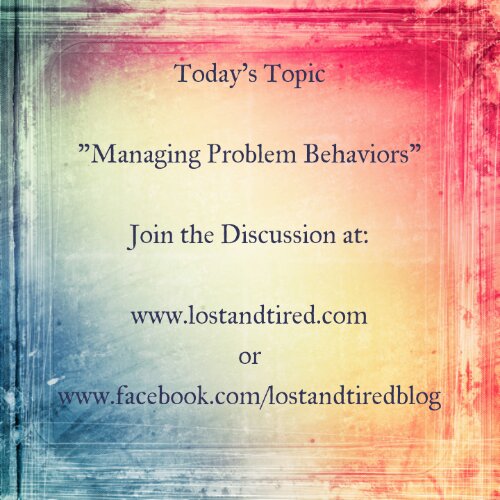I want to try and get back to doing Daily Topics. Today’s topic was requested by my readers know Facebook.
We are going to be talking about Managing Problem Behaviors.
Things like meltdowns, aggressive behaviors and anything else that’s on topic. No question will be looked on as silly. We can all help each other by sharing our own experience and knowledge.
Don’t be shy and join the discussion. Ask questions or answer someone else’s.
This discussion will take place right here in the comments below as well as on Facebook (www.facebook.com/lostandtiredblog). Comments made in the Facebook thread should be imported into the comments below.
This site is managed almost exclusively via WordPress for Android. Please forgive any typos as autocorrect HATES me. 😉
Visit the My Autism Help Forums
To reach me via email, please Contact Me



Thank you, we use a weighted blanket and have tried brushing in the past. I agree the meltdowns are VERY tough to diffuse. I always feel so bad for my little guy when he is so out of control of himself.
Meltdowns are very tough to actually defuse. If it’s a meltdown and not a tantrum, many kids respond well to sensory techniques. Things like weighted blankets, joint manipulation and brushing have helped my little ones.
shawnarenee31 in my experience, diffusing an actual meltdown is very challenging. Typically, this is because whilst in the throws of a true meltdown, the person may not even be able to hear you. Their body is purging, most likely from something like overstimulation. Calming things like deep pressure etc, can help.
However, if this is a tantrum and not an actual meltdown, then there are different ways to approach it. Typically, when it comes to knowing the difference between a meltdown and a tantrum, we look for one big thing.
Essentially, a tantrum will have an endgame and be caused by something like, not getting their way. We deal with lots of these.
I know I probably didn’t answer you but I have a meltdown to deal with at the moment, with my youngest. 🙁
The most problematic behavior we are dealing with right now is aggression. When my son is in the middle of a meltdown he is SO aggressive. He is at a point where he is being restrained for about 70% of his meltdowns. We have not found any solutions to dealing with his aggression other than restraining him when he becomes really aggressive.
what behaviors to find particularly problematic? What if anything have you found to help address these problems?
What
are some good strategies to use to calm a meltdown once it has started?
We have tried quiet spots, calming voices, and ignoring the meltdown
completely, none of which have seemed to work.
shawnarenee31 lostandtired When a child (or anyone) is in meltdown, they lose the ability to rationalise or reason through the situation. The brain goes into survival mode and a whole load of neuro chemicals shut down higher brain functions. For kids on the spectrum, who often have some degree of speech and language difficulty, I often find that simplifying and reducing (or completely eliminating) language can help as sometimes words just add another layer of confusion and dysregulation. Usually sensory based intervention – deep pressure, squeezing, squashing, calming music, slow rocking or other backwards and forwards movement – are most effective. Some kids just need to be isolated and left alone until they calm down.
When it comes to meltdowns, what’s important is what comes before and after. What set the child off (sensory overstimulation, being told no, disappointment etc) and what do they achieve (intentionally or not) or are trying to achieve through the meltdown?
Depending on the abilities of the child, I use the concept of a “thermometer” to gauge a child’s emotions on a scale of 1-3, we also establish a “tool kit” of “sadness erasers” and “anger erasers” that can be implemented when the child begins to escalate. This kind of education needs to be done when the child is completely calm and rational to teach them how emotions feel in their body and what they can do to stop getting to “number 3 angry” – a lot of kids will need adult assistance to identify when they’re number 1 and number 2 etc, self regulation is a very high level skill.
I find this book useful for higher functioning kids:
http://suelarkey.com.au/Promo_-_Red_Beast_Book.php it's a nice way of helping kids realise that they’re not the only ones that feel angry and what anger feels like.
Okay I’ll stop now 🙂
What are some good strategies to use to calm a meltdown once it has started? We have tried quiet spots, calming voices, and ignoring the meltdown completely, none of which have seemed to work.
What behaviors do you find the most problematic?